
Reviews and recommendations are unbiased and products are independently selected. Postmedia may earn an affiliate commission from purchases made through links on this page.
Article content
When I was 17, I dreamt of being a forest ranger or a marine mammal trainer. But I made a more practical choice and got an accounting degree. I like working with numbers but I never forgot about animals, often writing about them in my latest incarnation as a freelance journalist.
Recently, I decided to follow my childhood dreams and sign up for “whale school,” also known as the Marine Mammal Naturalist Course — a four-day intensive workshop offered by the Marine Education & Research Society (MERS) at the University of Vancouver Island in Nanaimo. Many participants would be kayak or whale watching guides. I feared I’d be the oldest person in the classroom — it had been four decades since I graduated from university — but I wanted to see if my second act could be as rewarding as the first.
Advertisement 2
Story continues below
Article content
I packed my notebooks and coloured pens, preparing for the first day of school with all the giddiness I remember from my earliest university days.
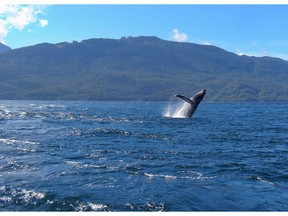
As I settled into my seat in the lecture hall that first day, I saw a few white-haired heads amongst the ball caps bearing crests of adventure companies. We all introduced ourselves. One young man said his job was to tell stories about whales. Laughter erupted when he said he’d like them to be true.
Then a gentleman named Joe stood up and explained how he’d tried to get a job as a marine naturalist for four years. He’d been turned down each time so he became a doctor instead! The class burst into applause as he explained that at 76, he was retiring from a career in cancer research to follow his first love of marine ecology.
I have been going to the West Coast for decades — once to write a story on orcas. Jackie Hilderling had been the naturalist on board the ship I travelled on during that trip. Now, she was one of the instructors at whale school and a MERS co-founder.
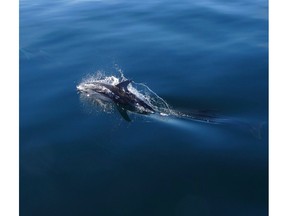
While the only whales I saw during the course were in videos, I wasn’t bored. I heard how whales, sea lions and otters had been feared or reviled at one time and hunted or harassed. First Nations had a better perspective all along — they revered whales. They also realized humans are connected to all creatures.
Article content
Advertisement 3
Story continues below
Article content
Hilderling explained that evolving attitudes towards whales show people are capable of great change. MERS hopes those taking their courses will fuel further change, acting as ambassadors for Canada’s west coast marine life.
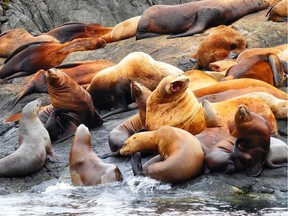
The course was fascinating and each day I was ready to learn more.
I learned about what is needed to free whales entangled in fishing gear. Hint: it’s not amateurs jumping into dangerous situations with a knife. I memorized visual and behavioural clues to identify marine mammal species in bad light and from bad photos. It was harder than I expected.
And I learned famed biologist/broadcaster David Attenborough is also interested in Canada’s west coast whales. That’s because Hilderling and other MERS researchers have observed humpbacks engaged in a feeding behavior not seen elsewhere.
Without large fish concentrations found in other places like Alaska, the humpbacks near B.C. don’t seem to form groups for bubble-net feeding — the common whale behaviour of blowing bubbles to confuse fish and pushing them together to then eat. Instead, some whales here have been observed floating vertically in the water with their mouths open, waiting for fish to swim in and then swallowing, rather like a carnivorous pitcher plant. This behaviour is now known as trap feeding and footage shot in B.C. — narrated by Attenborough — was recently released in BBC’s Planet Earth III series.
Advertisement 4
Story continues below
Article content
On the final day of the course, we were encouraged to dress in marine-themed attire. I strapped two plush krill-like creatures to a floppy hat, while donning pearls and a flannel shirt, for a Beverly Krillbilly costume (a play on 1960s show The Beverly Hillbillies). I clutched the “best invertebrate” costume prize I received as eagerly as I’d once held my university degrees years earlier. I won’t earn as much from this achievement but the return to my first interests felt just as valuable.
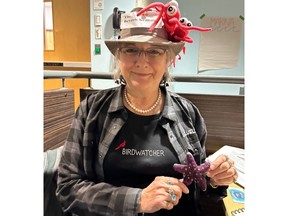
This year, as the day to raise awareness of how we benefit from oceans — World Ocean Day (June 8) — occurs, I’ll have a better understanding of how my life is connected to water and why it’s never too late to change course.
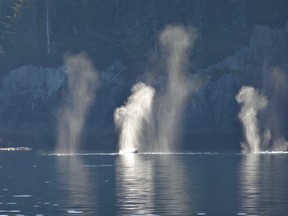
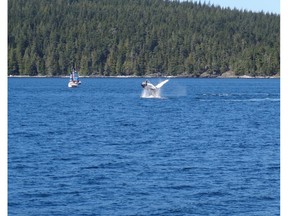
More of Carol Patterson’s photos are @thecarolpatterson on Instagram.
* * * * *
Article content
Comments